
Did you know that nearly 50% of women in their 20s and 25% in their 40s experience hormonal acne?
Yes, even when you think you’ve left the awkward teenage years behind, your hormones might still have other plans for your skin! It’s frustrating, isn’t it?
Here’s the truth: hormonal acne isn’t just about a random pimple here and there—it’s your body’s way of saying, “Something’s a little off.”
But the good news is that with the right approach, you can balance those hormones, calm your skin, and finally say goodbye to those unwelcome breakouts.
Ready to dive in? Let’s decode this hormonal mystery together!
There are three biggest troublemakers when it comes to hormonal acne: menstrual cycles, pregnancy, and PCOS. And don’t worry, I’ll explain it all step by step. Ready? Let’s go!
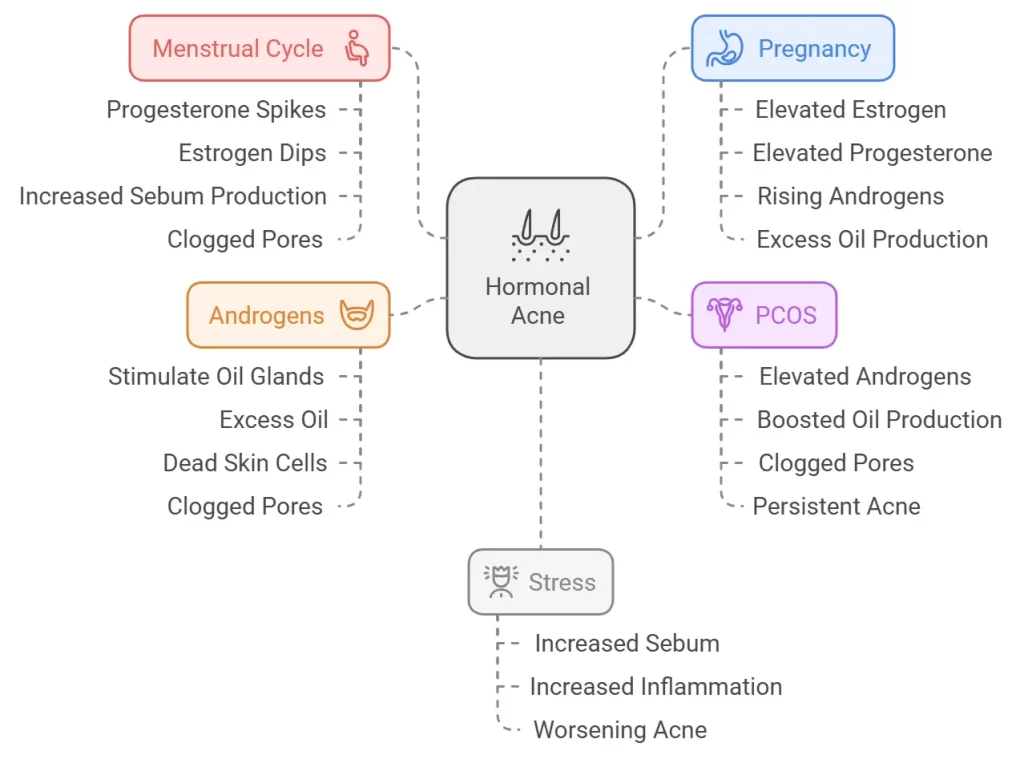
Your body is like a carefully balanced orchestra of hormones. But sometimes, a few players hit the wrong notes—cue hormonal acne!
Ever noticed those pesky breakouts right before your period? That’s because in the second half of your cycle, progesterone levels spike, and estrogen starts to dip.
Progesterone increases oil production in your skin. At the same time, androgens also rise and boost oil production. Too much oil clogs your pores, causing breakouts.
During pregnancy, hormones are produced in much larger amounts. Two female hormones, Estrogen and Progesterone, also rise. Actually, they help to reduce acne. But the problem is that androgen levels also rise. This triggers extra oil production. It is like over-watering a plant. Too much oil blocks your pores, leading to hormonal acne.
PCOS leads to hormonal imbalance. Women with PCOS experience higher levels of androgens, also called “male hormones.” Androgens increase oil production in the skin. Excess oil clogs pores and causes acne. It’s like being stuck in a cycle of too much oil and breakouts.
Androgens are key players in hormonal acne.
Androgens are like overenthusiastic managers of your skin’s oil glands. They order the glands to pump out more sebum (that’s the oily stuff your skin naturally produces). While some oil is good—it keeps your skin moisturized—too much of it mixes with dead skin cells and dirt, creating the perfect storm for clogged pores.
Imagine pouring too much syrup into a straw. At first, it flows, but eventually, it gets blocked, right? That’s exactly what happens in your pores. When bacteria attach to these clogged pores, it leads to hormonal acne.
Now, let’s talk about stress. Ever had a major deadline or gone through a tough time and suddenly noticed your skin acting up? Stress and acne go hand in hand.
When you’re stressed, your body produces more cortisol, which is like your body’s built-in alarm system. But cortisol also stimulates your oil glands to produce more sebum (are you noticing a pattern here?). Think of cortisol as a boss yelling at the oil glands to “work harder!”—and they listen.
But that’s not all. Stress also increases inflammation, making any existing acne angrier and redder. It’s like throwing gasoline on a small flame—it turns a tiny pimple into a full-blown breakout.
Hormonal acne tends to strike during life stages with major hormonal shifts. For many, it’s worst in the teenage years due to the surge in androgens during puberty. It can also flare up in your 20s or even later during pregnancy, menstrual cycles, or menopause. These shifts in hormone levels can make your skin more prone to breakouts at specific times.
For example, during the menstrual cycle, hormonal acne often appears in the week leading up to your period. This is when progesterone and androgen levels rise, increasing oil production and clogging pores.
The good news is that, for many, hormonal acne does get better with time. Acne often fades naturally as your body stabilizes its hormone levels—whether it’s after puberty, pregnancy, or other life changes.
However, some factors can make it stick around longer, such as genetics, chronic conditions like PCOS, or ongoing lifestyle triggers like stress or diet. If hormonal acne persists, it’s a signal that your body might need extra help, and that’s where treatments and lifestyle changes can make a big difference.
Hormonal imbalances can feel overwhelming, but small, consistent changes in your lifestyle and diet can help restore balance and improve your skin. Here’s how:
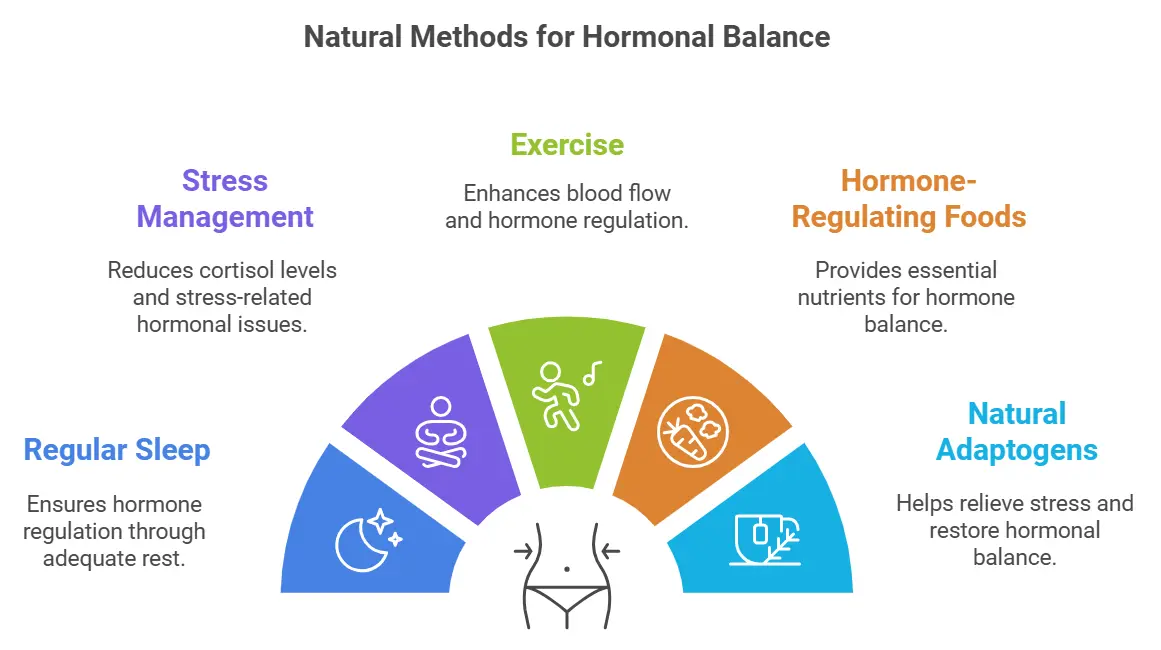
During sleep, our body repairs itself. Poor sleep disrupts the production of hormones like cortisol, which can lead to more stress and acne. Ideally, we need 7-9 hours of quality sleep every night to help our bodies regulate its hormone levels.
Chronic stress raises cortisol levels, which can worsen hormonal acne. Stress-relieving activities like meditation, deep breathing, or journaling can help reduce stress. Even taking 10 minutes a day to relax can make a big difference.
Physical activity helps your body regulate hormones and improves blood flow, supporting healthier skin. Moderate exercise, like brisk walking or yoga, also lowers cortisol levels and helps balance androgens.
What you eat plays a huge role in hormone balance. Foods like omega-3-rich fish (e.g., salmon, mackerel), leafy greens, nuts, and seeds provide essential hormone-regulation nutrients. These foods also reduce inflammation, which is a major contributor to acne.
Ashwagandha, holy basil, and maca root help relieve stress and restore hormonal balance. They are available in teas, powders, or capsules, making them simple to add to your daily routine.
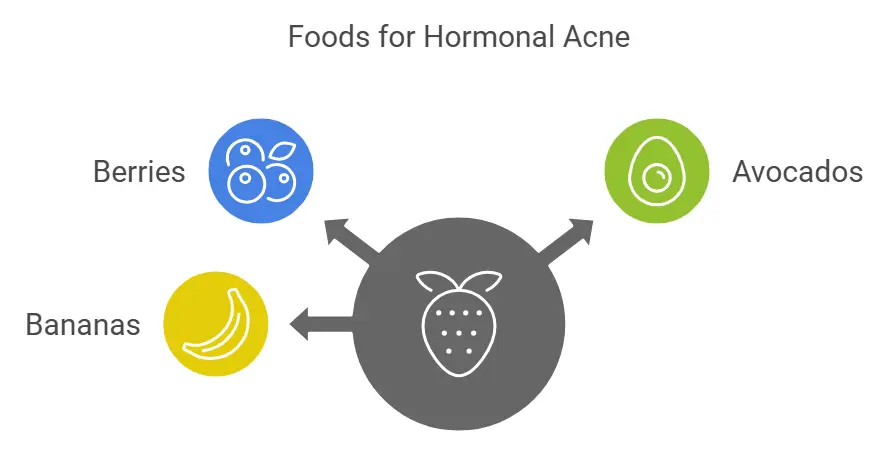
Include anti-inflammatory foods in your diet.
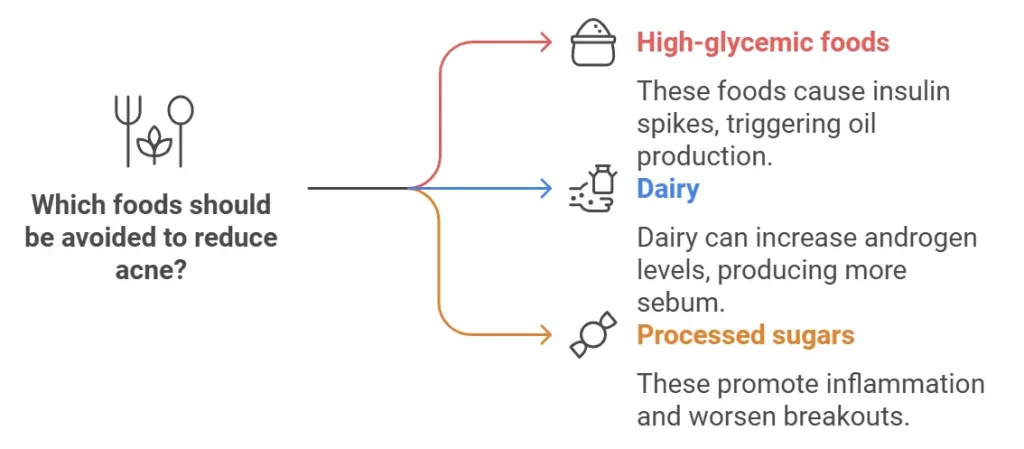
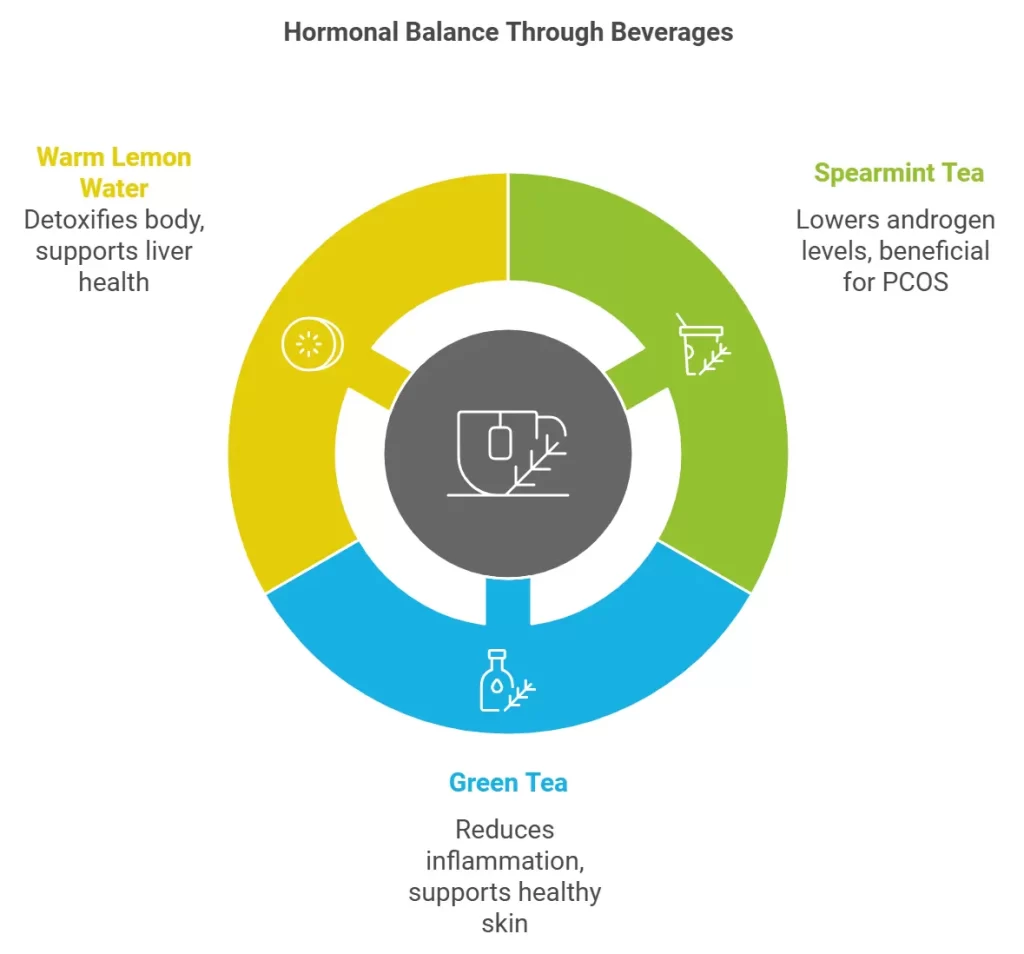
Yes, absolutely! Exercise is one of the simplest and most effective ways to balance your hormones.
Yoga combines gentle movement with deep breathing, which reduces stress and promotes hormone regulation. Certain poses like a child’s pose and twists can even stimulate hormone-producing glands.
A brisk 30-minute walk can help regulate cortisol and insulin levels, both of which play a role in acne. It’s a low-impact way to stay active without overexerting yourself.
Lifting weights or doing bodyweight exercises boosts muscle growth and helps balance hormones like testosterone and growth hormone. It also improves insulin sensitivity, which reduces breakouts caused by blood sugar spikes.
By incorporating these small but powerful changes into your routine, you can take charge of your hormones and enjoy clearer, healthier skin. It’s not just about treating acne—it’s about nurturing your overall well-being!
When hormonal acne becomes persistent or severe, combining medical treatments and lifestyle changes can help you regain control. Let’s break it down.
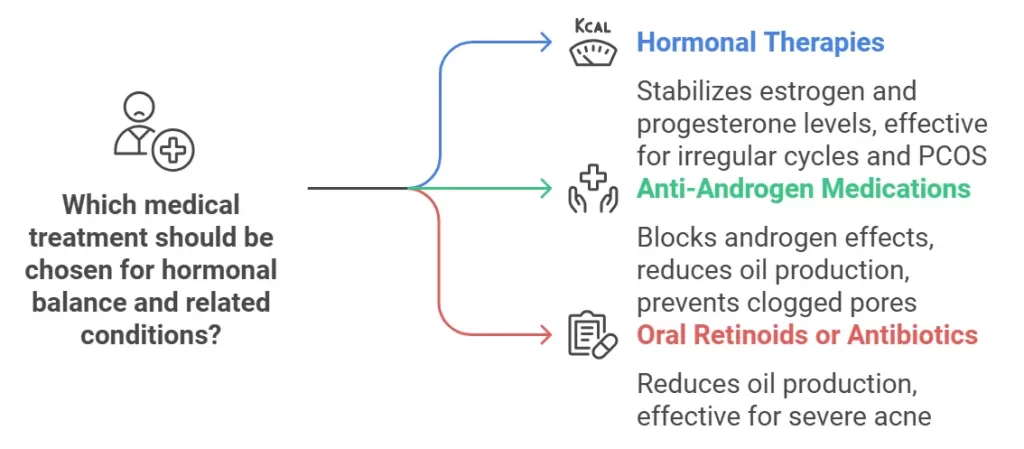
Oral contraceptives/birth control pills can help balance hormones by stabilizing estrogen and progesterone levels. They’re particularly effective for women with irregular cycles or PCOS. Think of them as a reset button for your hormonal fluctuations.
Medications like spironolactone are prescribed to block the effects of androgens. Androgens stimulate oil production, so reducing their impact can significantly lower sebum levels and prevent clogged pores.
Small, mindful changes in your daily routine can greatly impact managing hormonal acne.
Stress raises cortisol levels, which can worsen acne. Incorporate stress-relief practices like:
If you’ve tried over-the-counter products and lifestyle adjustments with little success, it might be time to explore more advanced options.
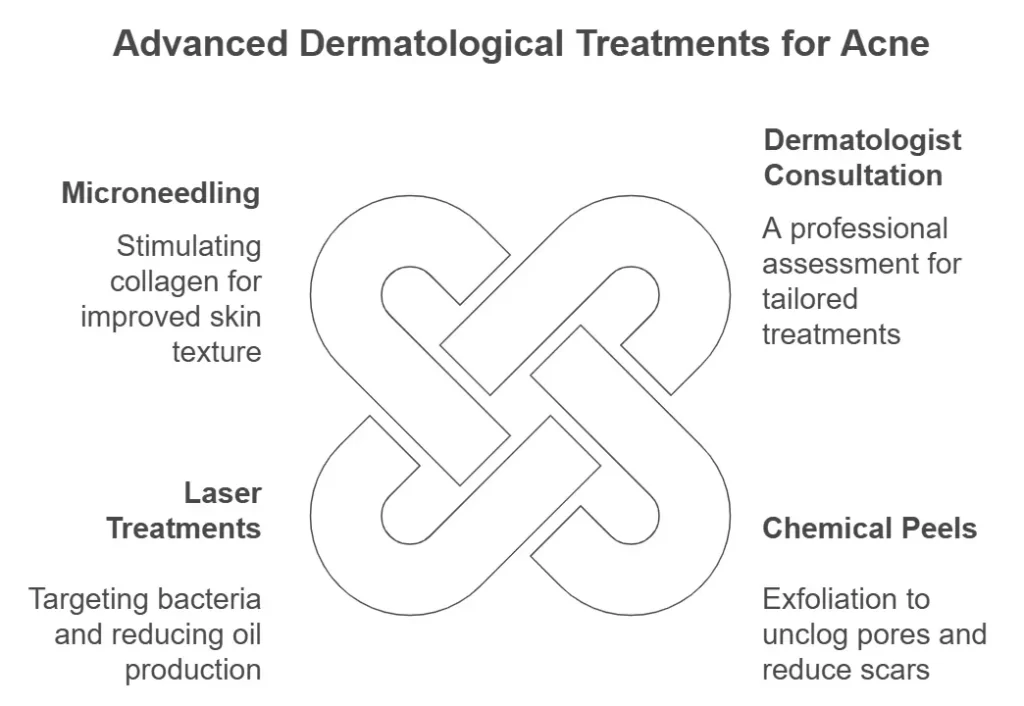
For persistent acne or scarring, dermatologists may suggest:
You can tackle hormonal acne from all angles by combining medical treatments with practical lifestyle changes. The key is patience and consistency—clear skin is a journey, but with the right approach, you’ll get there!
Acne may fade, but the scars it leaves behind can be frustrating. But with the right approach, you can significantly improve their appearance over time. Here are the best ways to heal hormonal acne scars.
For mild scars, certain topical treatments can work wonders when used consistently:
For deeper or more stubborn scars, professional treatments might be necessary:
Healing acne scars isn’t an overnight process—it takes time. Consistency is key whether you’re using products at home or undergoing professional treatments. Stick to your routine, follow your dermatologist’s advice, and be patient. Your skin’s natural healing process works best when given time and care.
Scars don’t define you—they’re part of your journey. With the right tools and approach, you can fade them and feel confident in your skin again!
Yes, ice can help, but only as a temporary fix.
Clearing skin naturally requires a holistic approach:
It’s about nourishing your skin from the inside out while maintaining healthy habits.
Look for non-comedogenic products, meaning they won’t clog your pores. Here’s a quick guide:
Consistent use of the right products can help manage breakouts and improve your skin over time.
Hormonal acne isn’t just a surface-level issue—it requires a well-rounded approach. Balancing hormones through diet, exercise, and stress management, combined with a consistent skincare routine, is key to tackling it effectively.
Clear skin takes time, and every step you take brings you closer to healthier skin. Seeking professional advice early can provide the right guidance and treatments to support your journey. Stay consistent and patient—your efforts will pay off.